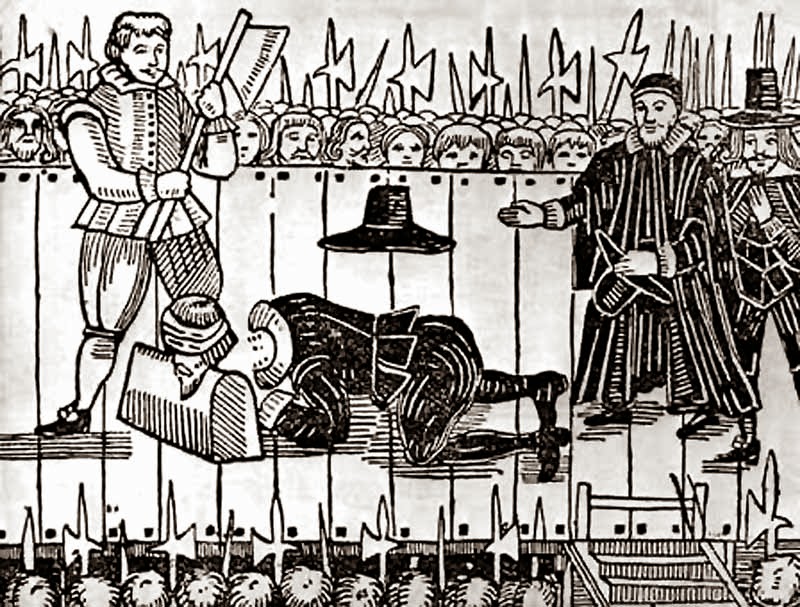Was the Execution of Charles in 1649 Legal?
Leonid asks: Could parliament legally depose a king at all? If my memory is correct, in 1649 parliament’s lawyers tried to find a law or a legal precedent for trying/deposing a king and they could not find anything suitable.
Parliament had no clear authority to try the king in January 1649, which basically explains why, despite efforts to find a sound legal basis for the trial, half of England's lawyers refused to recognise the post-regicidal order (this is more or less the argument of Derek Hirst). The trial was chaotic. Behind the scenes law was being created on the hoof, there were many disagreements. The recent precedents -- the Earl of Strafford in 1641 and Archbishop William Laud in 1645 -- had only legitimised parliament’s authority in the conviction and execution of members of the king’s court on treason charges. It was still up for debate whether a divinely appointed ‘two bodied’ king was immune from mere mortals. Parliament had been ‘purged’ in order to produce a majority supporting the indictment against Charles I, and it had trouble assembling enough reputable commissioners to manage the trial. In any case, Charles just flat refused to recognise the court (which was a new court created for the purpose), insisting he was appointed by God and above the laws of parliament. Famously he asked:
In context the trial can be seen as an ugly episode in parliament’s struggle to assert its sovereignty. The uncertainties reflected England's constitutional flux. In late 1640s everything was up for grabs. Many parliamentarians and lawyers sincerely believed by bringing the king to trial they were asserting a fundamental even ancient right of parliament to govern. It was also a negotiating ploy to secure concessions from the king; they did not expect Charles to be so intransigent at his trial.
Due process was a mess, but the charge against the king was simple - Charles had broken his coronation oath by ruling without parliament, by ruling personally and arbitrarily rather than impersonally and within the law. Alan Orr has written a useful book arguing that 1649 was an important watershed in establishing that treason is crime committed against the state rather than against the king. Thenceforth the king too could be guilty of treason. Before 1649 it was quite acceptable to say that all law issued from the king. After the acts of parliament that followed the execution, it was easier to say law issued from ‘the people’ through parliament. The king was not above the law, his natural body was now separated from the corporate body of the state. He became, in effect, a magistrate rather than a sovereign. The new commonwealth government went even further in March 1649 by simply abolishing the ‘office’ of king altogether.
By 1688 republicans might have argued that 1649 had created the precedent for deposition of a king. However, even though all legal decisions of the interregnum had been retrospectively validated in 1660, it’s not crystal clear even then that the negotiated terms of the ‘restoration’ of Charles II precisely legitimised what occurred in 1649. The opposite might be inferred from the indemnities agreed with Charles II, which specifically made an exception for the regicides, various of whom were executed at his pleasure. What perhaps most people did agree on even in 1649 was that if a king could be tried and deposed then that might only be done with parliament’s authority. Even Charles II did not attempt to amend the treason ‘act’ of 1649 which post-hoc validated his father’s execution.
For views a little more sympathetic to the predicament of Charles I see Kevin Sharpe and Mark Kishlansky. Historians who take the constitutional event of the trial of Charles I more in their stride include Christopher Hill.
Parliament had no clear authority to try the king in January 1649, which basically explains why, despite efforts to find a sound legal basis for the trial, half of England's lawyers refused to recognise the post-regicidal order (this is more or less the argument of Derek Hirst). The trial was chaotic. Behind the scenes law was being created on the hoof, there were many disagreements. The recent precedents -- the Earl of Strafford in 1641 and Archbishop William Laud in 1645 -- had only legitimised parliament’s authority in the conviction and execution of members of the king’s court on treason charges. It was still up for debate whether a divinely appointed ‘two bodied’ king was immune from mere mortals. Parliament had been ‘purged’ in order to produce a majority supporting the indictment against Charles I, and it had trouble assembling enough reputable commissioners to manage the trial. In any case, Charles just flat refused to recognise the court (which was a new court created for the purpose), insisting he was appointed by God and above the laws of parliament. Famously he asked:
“By what lawful authority am I seated here?”
The reply of the president of the court, John Bradshawe, was:
“By the authority of the Commons of England, assembled in Parliament in the behalf of the people of England, by which people you are elected King.”
In context the trial can be seen as an ugly episode in parliament’s struggle to assert its sovereignty. The uncertainties reflected England's constitutional flux. In late 1640s everything was up for grabs. Many parliamentarians and lawyers sincerely believed by bringing the king to trial they were asserting a fundamental even ancient right of parliament to govern. It was also a negotiating ploy to secure concessions from the king; they did not expect Charles to be so intransigent at his trial.
Michael G. Heller ©2014



